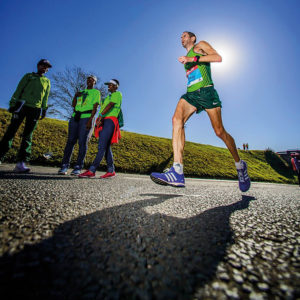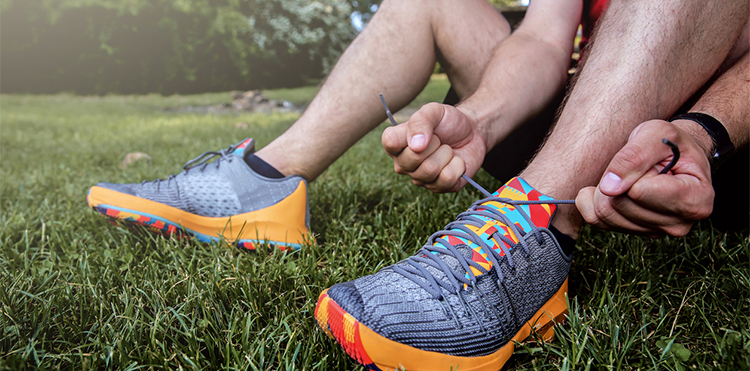1) Believe it
Sports therapist Alan Murray (www.botanicahealthandsport.co.uk) says Ardern’s findings ring true in his experience, and he gives clients mental fitness tips as part of their treatment. He says simply believing your injury will heal can make a huge impact on physical recovery. “Injured runners instinctively focus on the physical aspects of healing, without paying attention to their attitude,” he says. “Clients can be quite negative when they first walk in, especially if they have seen several different therapists and their injury persists. Some simply don’t believe they will recover; their negativity manifests physically by way of fatigue, muscle soreness and tension.”
2) Tempo train your brain
The value of mental fitness is gaining traction in sport in terms of improving and sustaining performance, managing pain, and, at the elite level, helping athletes manage the pressures of competitive sport with help from a team of experts including sports psychologists. For the average runner, however, for whom running is a vital part of life, while physically recovering is a structured and measurable process, that is, seek and follow expert advice, rest, follow a rehab plan and start back slowly, developing your own mental training tactics is also essential as part of your recovery.
3) Visualisation and imagery
Murray took me through a few simple exercises using positive and negative visualisation techniques to demonstrate the impact your attitude can have on your body. The results were astounding. When I visualised negative images and thought about a stressful situation, my resistance was futile, my muscles weak. Then I visualised a happy experience and thought about things that bring joy to my life, my muscles were strong and my resistance good. The same results occurred when testing my flexibility. Fast forward to race day, and it’s easy to see how runners’ nerves, fears of injury and PB pressures affect their physical performance. “Imagining yourself and the steps you need to take to achieve your goal of getting back to full fitness builds mental strength,” says sport and health psychologist Prof Martin Hagger, who works with elite athletes at Curtin University in Perth, Australia.
4) Be in the NOW and manage expectations
“It’s vital not compare yourself to the past,” says Sarah Russell, running and biomechanics coach (www.sarah-russell.co.uk). “Use the past as a guide in terms of returning to running, but don’t automatically assume you will be back right where you were. And realise that it’s okay not to be!” “Manage your expectations and re-set quickly, drawing a line in the sand, particularly with long-term injury. It’s about being in the moment. Live in the now and be content with where you are and allow your body time to recover. There can be lots of unknowns.”
5) Self-check-in
“Schedule ‘mental fitness’ into your daily routine, just as you do with your run,” says sports performance coach and psychologist Pete Cohen. “Focus on exercising your mind, and seek out others who have had a similar injury, and ask them what they did to stay strong and positive. Lots of PTs today specialise in recovery and can provide mental support.” “Set up a clear plan and use a wall chart to map out your short and long-term goals, and stick to them,” says Hagger, who says planning and consistency are vital for keeping positive.
6) Reinvent yourself
Get to know your personality and what makes you tick so you can rehab effectively and quickly. “Running is intuitive,” says Russell. Think about why you run and what you actually enjoy from the process. “Change what defines you. Time-based performance isn’t necessarily the best parameter to use to gauge your ability or identity as a runner. Ask yourself, why do I run? Be clear about why you run and keep a clear perspective when injured,” adds Russell.
7) Regroup
While you are recovering, consider changing groups so you are not pressured into performing at your previous level. “Become a rehab runner. If you usually run alone, join a group to help build your confidence,” says Russell. “Look into less formal or local smaller groups to join, or run with a couple of friends who can act as a support network.”
8) Self-talk
“Do you remember the boxer Marvin Hagler?” asks Cohen. “He used positive affirmation when injured. During rehab he skipped for hours, repeating the words: ‘I’m getting better, I’m getting meaner’ – and he did.” “Self-talk is extremely effective. Come up with a motivational mantra that keeps you going when things get tough during rehab/recovery,” adds Hagger.
9) Active Recovery
“It’s all about walking before you can run,” says Paralympic world champion Tim Prendergast (see case study), who jumped straight into an active recovery programme when Achilles tendinopathy set him back for four months during crucial pre-Olympics training in 2011. “Listen to your physio, trainer, or coach, and follow their instructions to the letter!” advises Hagger, for mental reassurance and support, as well as physical progression.
See your physio or coach for a programme that includes strength and conditioning exercises. Not only does it allow you to focus on weaker areas that need conditioning and strengthening, it helps you keep mentally fit and focused as you see your progression.
Want your say? Email us at editorial@wildbunchmedia.co.uk
Join the Men’s Running community for more comment, analysis and race information direct your inbox. Follow us on twitter@mensrunninguk







